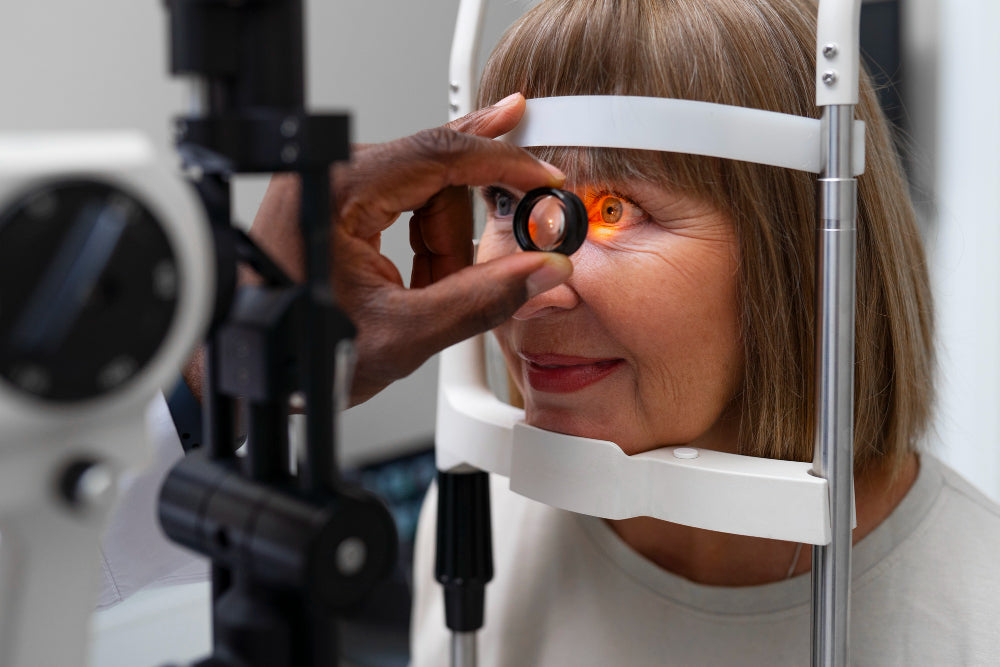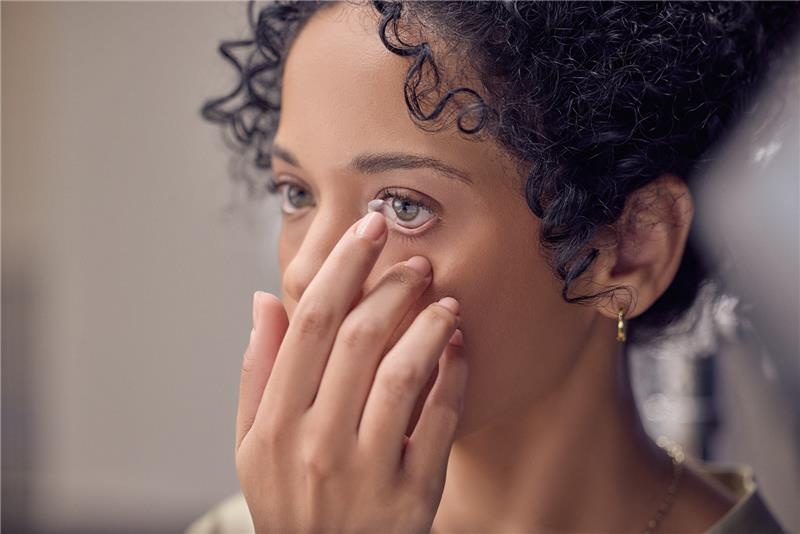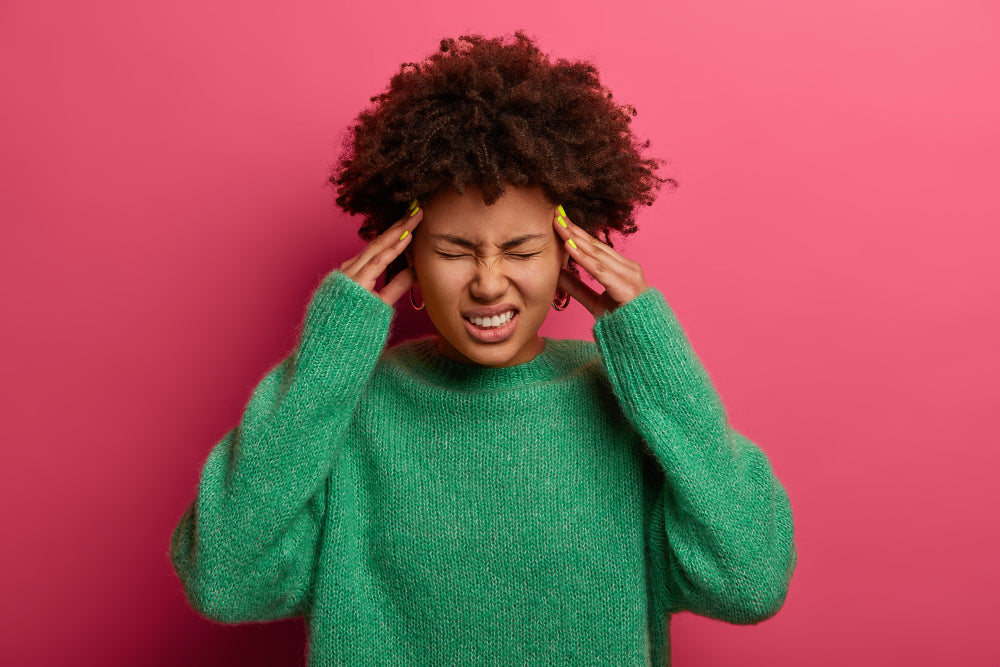We all know the feeling – that groggy, exhausted state after a restless night. But beyond the fatigue and decreased focus, lack of sleep can cause uncomfortable and even concerning symptoms for your eyes.
This raises the question: Can lack of sleep affect vision? The answer is yes. While sleep deprivation isn't likely to permanently damage your eyesight, it can certainly cause temporary problems that disrupt your daily life.
When you don't get enough sleep, it can significantly impact your eyesight. This can lead to a range of issues, from blurry vision to eye pain.
In this blog post, we'll explore the effects of lack of sleep on your eyesight and provide tips on maintaining healthy vision.
The Connection Between Sleep and Vision

Sleep plays an important role in maintaining healthy vision. During sleep, good things happen. Your body repairs and regenerates damaged cells, including those in the eyes. This process helps maintain proper eye function. However, this repair process is disrupted when you don’t sleep enough, leading to various vision problems.
Chronic sleep deprivation can even increase the risk of more serious eye conditions over time, including dry eye syndrome and potential long-term damage due to inflammation.
Lack of sleep can also cause eye inflammation. When sleep-deprived, your body releases stress hormones, leading to inflammation that affects the eyes. This can worsen symptoms like dry eyes, redness, or puffiness; if left untreated, it may increase the risk of infections.
Additionally, the role of REM (Rapid Eye Movement) sleep is critical for visual processing. REM sleep helps your brain consolidate visual information, so chronic sleep deprivation could interfere with how your brain interprets what you see.
Can Lack of Sleep Affect Vision?
The answer is a resounding yes. Lack of sleep can affect your vision. When you don't sleep enough, your eyes may struggle to focus correctly, leading to blurry or double vision.
Additionally, sleep deprivation can exacerbate dry eyes. If you're experiencing vision issues, it's essential to prioritize getting proper sleep alongside taking regular breaks to rest your eyes.
Lack of Sleep Causes Various Eye Issues
We’ll further reinforce the effects of lack of sleep on your eyesight:
Blurry Vision
Lack of sleep can definitely cause blurry vision. When you don't get enough sleep, your eyes may struggle to focus properly, leading to blurry or hazy vision.
This can be especially problematic for people who rely on their vision for work or daily activities. Prioritize getting enough rest and sleep to rest your eyes.
Eye Twitching
A lack of sleep can lead to minor eye twitching or spasms. While this is generally harmless, persistent twitching can sometimes be a sign of a more serious condition, including rare neurological disorders. Eye twitching can also indicate an electrolyte imbalance in the body. If you’re drinking too much water, you can be depleting your electrolytes causing a state of hyponatremia. Electrolyte supplements can be useful in this case.
Eye Pain
Secondly, lack of sleep can also cause eye pain. When you don't sleep enough, your eyes may become irritated and inflamed, leading to pain or discomfort.
Eye pain can be a minor annoyance, but in some cases, it can be a sign of a more serious underlying issue. If you're experiencing persistent eye pain, consult a professional to address any underlying conditions.
Eye Strain
When you don't sleep enough, your eyes may struggle to focus correctly, leading to eye strain. Eye strain can cause various symptoms, including blurry vision, headaches, and fatigue.
If you're experiencing eye strain, prioritize resting your eyes with breaks. Sleep and eye disease have a clear connection, and lack of sleep can contribute to eye strain.
Note: Lack of sleep can also worsen common eye issues, including mild or chronic headaches.
Tips for Maintaining Healthy Vision

Maintaining healthy vision requires a combination of good sleep habits, regular eye care, and a healthier lifestyle. Follow some useful tips for maintaining healthy vision:
- Get Enough Sleep: To sleep enough, aim for 7-9 hours of sleep each night to help maintain healthy vision.
- Practice the 20-20-20 Rule: Take breaks from screens and focus on something 20 feet away for 20 seconds every 20 minutes to reduce digital eye strain.
- Stay Hydrated: Drink water when thirsty to keep your eyes adequately hydrated.
- Exercise Regularly: Physical activity can improve circulation thereby reducing inflammation, benefiting both your eyes and overall health.
Schedule regular eye exams so you can detect any underlying vision problems early.
Conclusion
Lack of sleep can significantly affect your vision, leading to a range of issues, from blurry vision to eye pain. By prioritizing good sleep habits, taking regular breaks to rest your eyes, and maintaining a healthy lifestyle, you can help maintain healthy vision.
About Vision Source Rio

At Vision Source Rio, we work hard to provide comprehensive eye care and help you maintain healthy vision. Our skilled eye care professionals are committed to delivering exceptional service and ensuring you receive the best care for your eyes.
Contact us today to schedule a visit and step toward maintaining a healthy vision.
Read On:
What Are the Causes of Dry Eyes at Night?





